Introduction
Is a baby walker good for children? This is a common question many parents ask when thinking about buying one. Baby walkers are designed to give young children mobility and help them explore their surroundings before they learn to walk on their own. But do they really benefit your child? In this article, we will explore 5 powerful reasons why a baby walker can be good for children, and how it can support their early development.
#1 Encourages Early Mobility
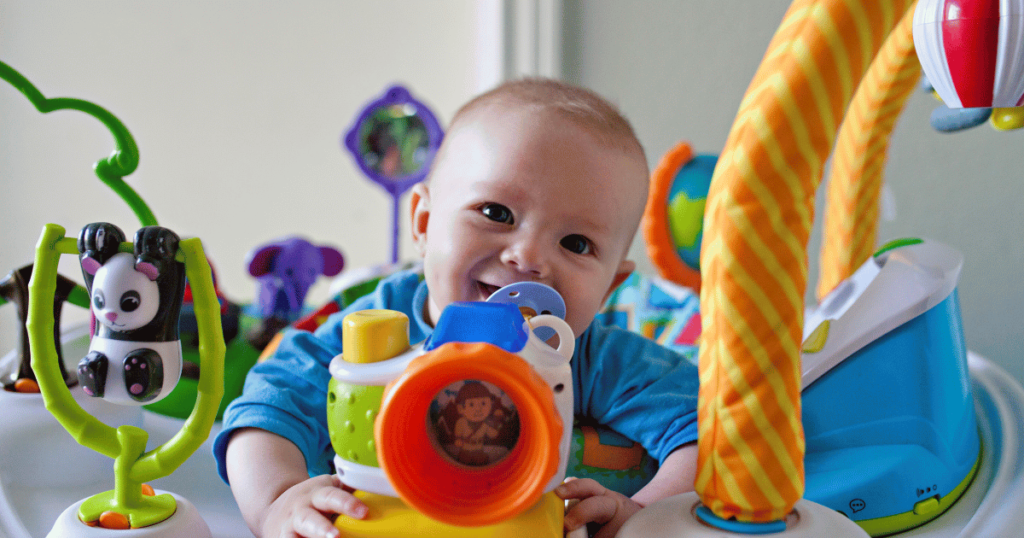
A baby walker allows children to move around freely, giving them a taste of independence before they learn to walk on their own. By pushing themselves in the walker, babies can move from one place to another, exploring their surroundings. This early movement can help build their confidence as they gain control over their legs and feet.
Many parents appreciate that walkers allow their children to experience mobility without constantly needing to be carried. It offers babies an opportunity to experience the world around them safely and with support.
At what age can babies start using walkers?
Babies can start using walkers between 4 and 16 months old. It’s best to wait until they can sit up and support their weight. This ensures they are developmentally ready. Always supervise them during use to keep them safe and prevent accidents while exploring.
#2 Strengthens Leg Muscles
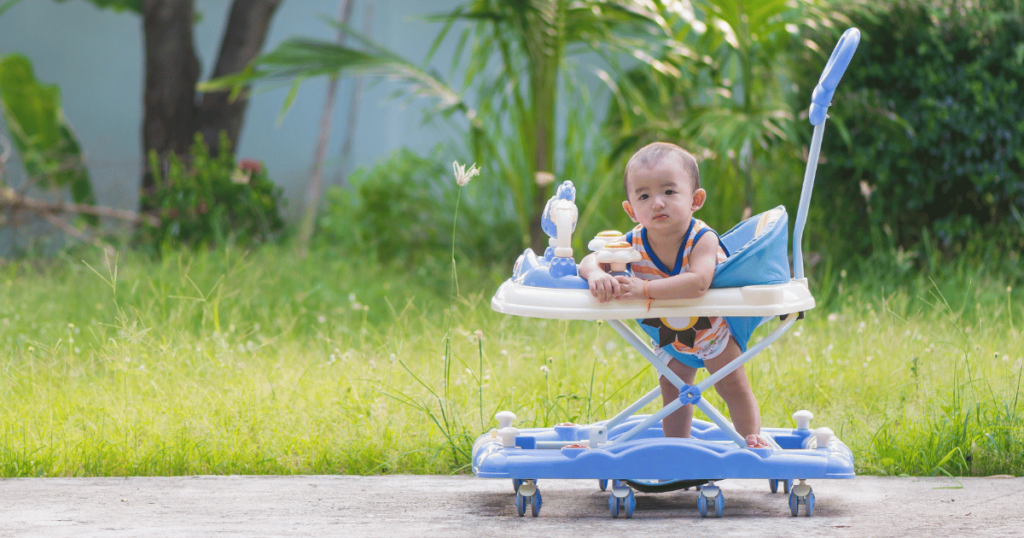
Using a baby walker can help children develop stronger leg muscles. As babies push themselves in the walker, they are using their legs to move forward, which strengthens the muscles they will need when they start walking on their own.
While walkers are not a substitute for learning to walk, they provide a way for babies to practice using their legs. The movement helps build the muscle strength needed for later milestones like standing and walking.
Do baby walkers help babies learn to walk?
Baby walkers may not effectively teach babies how to walk. While they allow infants to move, they don’t promote the natural walking process. Instead, they can delay walking skills by restricting essential movements. Encouraging crawling and standing is more beneficial for developing walking abilities in babies.
#3 Provides Entertainment and Engagement
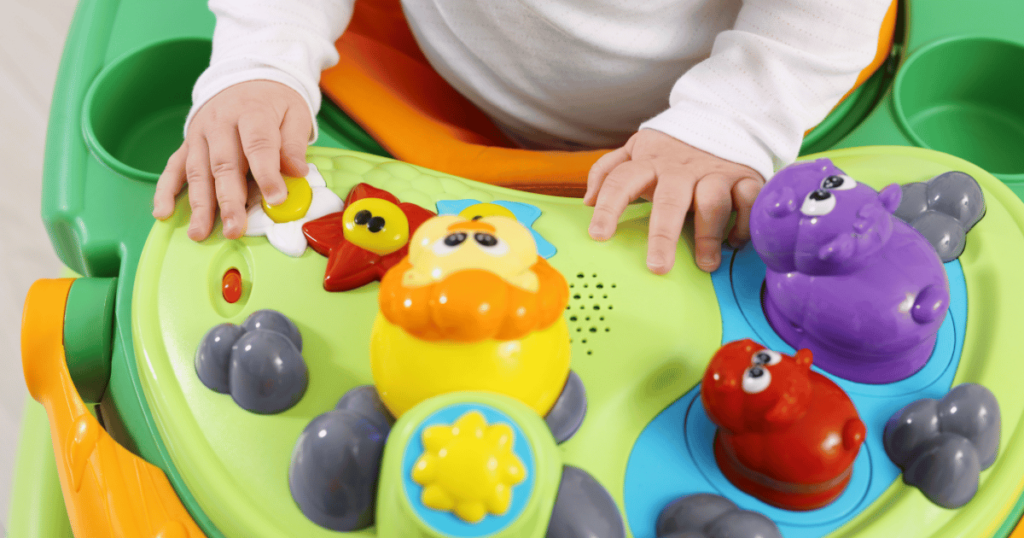
Baby walkers often come with built-in toys, lights, and sounds that entertain children while they move around. These engaging features help stimulate the senses and keep babies entertained for longer periods.
The interactive elements of a baby walker are not just for fun. They help develop hand-eye coordination and fine motor skills as babies reach for toys, press buttons, and interact with different objects. This playful engagement can promote cognitive development, as babies learn cause and effect while playing.
What features should you look for in a baby walker?
When selecting a baby walker, look for safety features like a wide base and sturdy construction. Opt for adjustable heights to fit your baby’s growth. Choose walkers with interactive toys for engagement. Also, ensure it is lightweight and easy to move, allowing for safe exploration around the home.
#4 Promotes Independence
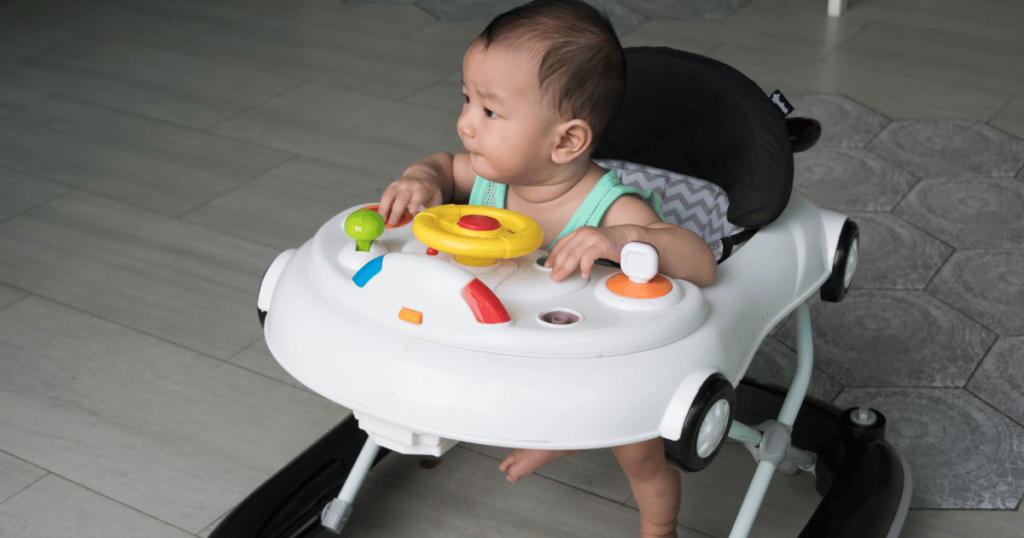
One of the most important benefits of a baby walker is that it promotes a sense of independence in young children. Babies love to explore, and a walker allows them to do just that in a safe way. They can move around freely within a confined space, which helps boost their confidence.
A baby walker allows children to have a bit more freedom than crawling. It encourages them to be more independent while still providing the support and balance they need.
In what ways do baby walkers foster independence in babies?
Baby walkers promote independence by allowing babies to move freely and explore their environment. As they navigate, they gain confidence in their abilities. This newfound mobility helps them discover new toys and activities. Such experiences foster self-reliance and encourage curiosity, which are essential for their overall development.
#5 Enhances Social Interaction
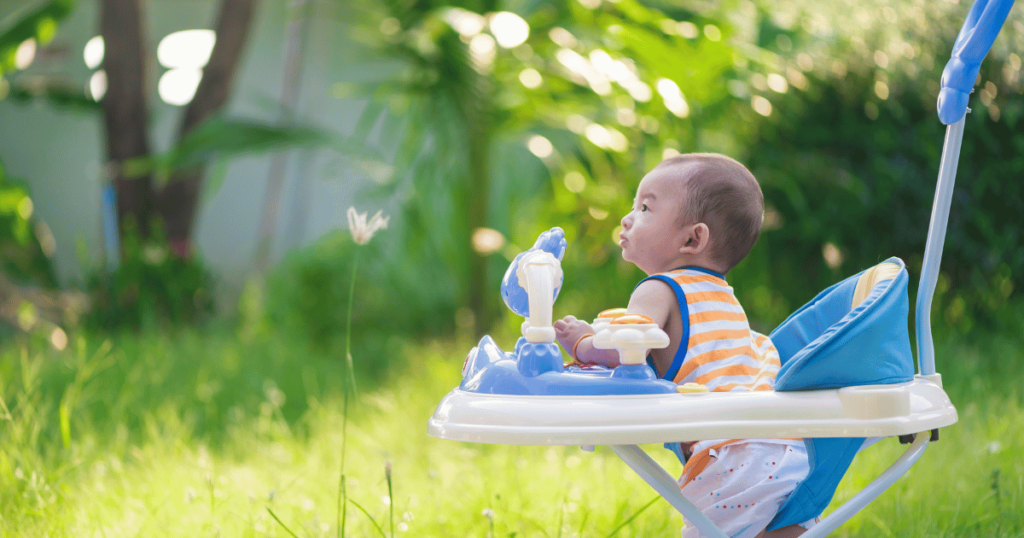
When babies use a walker, they can easily follow their parents or siblings around the house. This promotes interaction and helps them feel like they are part of the family activities. Walkers can encourage babies to explore different areas of the house where they can interact with others, play games, or watch family members.
The ability to move with ease helps babies engage more in social activities, which is important for their emotional and social development.
Can baby walkers improve social interaction?
Yes, baby walkers can improve social interaction. When babies use walkers, they can move closer to family members and peers. This proximity encourages communication and play. Engaging with others helps develop social skills, boosts confidence, and fosters relationships, making it an important part of early childhood development.
Safety Tips for Using a Baby Walker

While baby walkers can be good for children, it’s important to use them safely. Here are some important tips to consider:
- Supervise at All Times: Never leave your baby unattended in a walker. Make sure you are always nearby to prevent accidents.
- Use in a Safe Environment: Ensure the room is free of hazards, such as stairs or sharp objects. It’s best to use walkers on flat surfaces.
- Limit Time in the Walker: Don’t let your baby spend too much time in the walker. Balance walker time with other activities like floor play.
- Choose a Walker with Safety Features: Look for walkers with a wide base, safety brakes, and adjustable height to provide extra security.
Choosing the Right Baby Walker
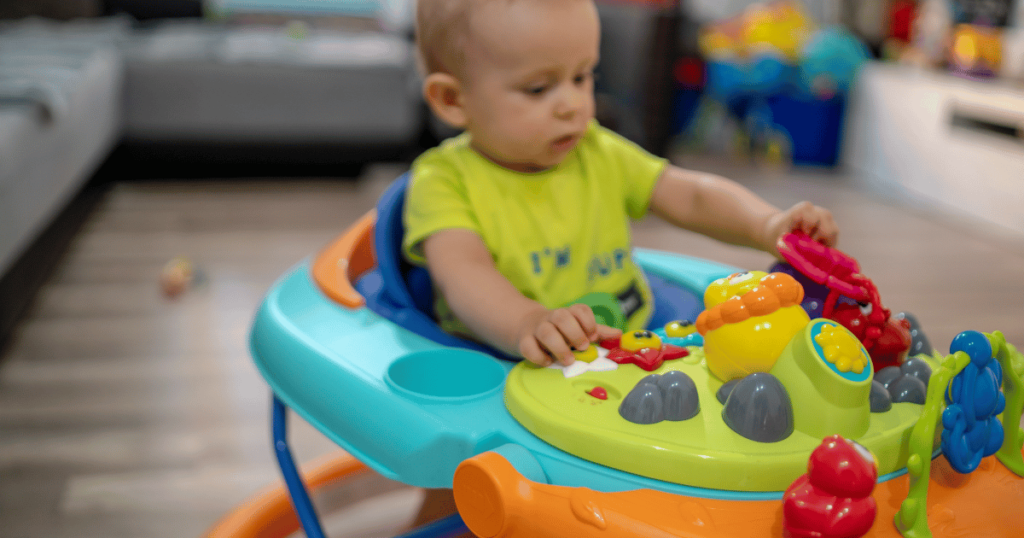
When choosing a baby walker, there are a few things to consider:
- Adjustability: Look for a walker that adjusts to your baby’s height.
- Interactive Features: Pick a walker with toys, sounds, or lights that will engage your baby.
- Safety Features: Make sure the walker has safety locks and a wide base to prevent tipping over.
Common Concerns About Baby Walkers
Are baby walkers safe for children?
Yes, but always use them under supervision and in a safe environment. Make sure the area is free of hazards such as stairs or sharp objects.
Can baby walkers delay walking?
There is no strong evidence that walkers delay walking. However, balance walker time with floor play to ensure babies develop their natural walking skills.
How long should babies use a walker?
Limit the time babies spend in walkers to 15-20 minutes at a time. Prolonged use may reduce opportunities for floor play, which is also important for development.
At what age did you let your child first start using a walker?
Most parents introduce their child to a walker when the baby is between 6 to 8 months old. At this age, babies have better head and neck control and can sit without support. It’s important to ensure your baby can bear some weight on their legs before using a walker. Always monitor your child closely when they are in a walker for safety.
Are baby walkers bad news for babies?
Baby walkers come with certain risks. They may delay your baby’s ability to walk naturally by encouraging unnatural movements. Walkers can also be dangerous, as they increase the chance of falls and access to harmful objects. Many experts recommend avoiding walkers and suggest using stationary play centers instead for safer development.
Is it safe for a six-month-old baby to use a walker for her legs?
A six-month-old baby might be ready for a walker, but you should be cautious. Using a walker too early can put stress on a baby’s legs and hips, leading to improper development. It’s essential to ensure that the baby can sit up independently and support some of their weight before using a walker.
Can I put my 3-month-old in a walker?
No, a 3-month-old is too young for a walker. At this age, babies lack the muscle strength and coordination needed to use a walker safely. It’s better to wait until the baby is older, around 6 months, when they have more control over their movements.
Are walkers good for the baby?
Walkers can entertain babies, but they are not essential for development. In fact, they can slow the natural walking process by limiting a baby’s ability to balance. Walkers also come with safety risks, such as falls and access to hazardous items. Stationary activity centers are often a safer alternative.
When is it appropriate to start using a walker for an infant?
A walker can be used for a baby around 6 to 8 months old. By this time, babies typically have developed the strength to sit on their own and support some of their weight. However, always consult with your pediatrician before introducing a walker to make sure your baby is ready.
Final Thoughts: Is a Baby Walker Good for Children?
Baby walkers offer many benefits, from encouraging early mobility to strengthening leg muscles. They promote independence, engage babies with toys, and provide parents with a few minutes of hands-free time. However, it’s crucial to use them safely and in moderation.
A baby walker can be a valuable tool in your child’s early development, as long as you balance its use with plenty of floor time and active play. The key is to ensure that your child is always safe and supervised while enjoying the benefits a walker can provide.
Other References
- American Academy of Pediatrics (AAP)
- What to Expect – March of Dimes
- KidsHealth from Nemours
- American Dental Association (ADA)
- WebMD
- What to Expect
- BabyCenter
- Verywell Family
- The Spruce
- Healthy Children
More to Read
- How to bathe a newborn baby in 13 steps: The comprehensive guide
- Getting the temperature just Right: A guide to baby bath water
- Bath Time: How often should you wash your little one
- Baby Bathtubs: The Best 5 Ways to Store Baby Bathtubs in 2024
- 4 Steps to Choose a Collapsible Baby Bathtub in 2024
- The Best 5 Baby Bathtubs for Small Space in 2024
- The Best 5 Inflatable Baby Bathtubs In 2024


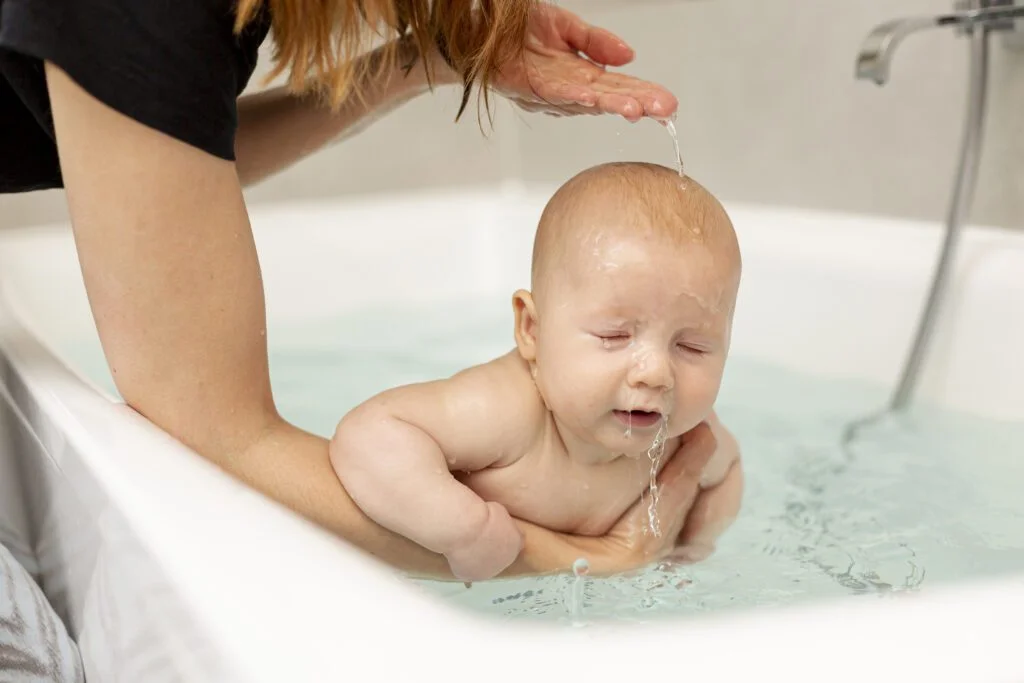

This is very interesting, You’re a very professional blogger.
I have joined your feed and stay up for searching for extra
of your great post. Additionally, I’ve shared your site in my social networks!